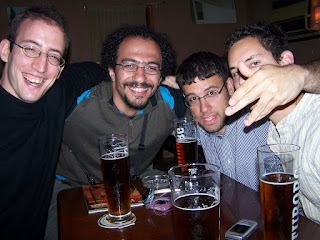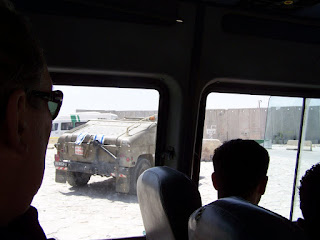
By Khaled Diab
After an all-night writing spree, in Jerusalem cafes and then in my hotel room, I woke up with a serious intellectual hangover on Sunday morning, so I decided to treat myself to a nice brunch. Before I left, I said goodbye to the incredibly earnest brother of the owner of the hotel, who turned out to be Palestinian.
I then caught one of the private minibuses to Tel Aviv. After engaging me in conversation in English, the guy sitting next to me switched to Arabic when he discovered that I was an Egyptian. It turned out that he was a Palestinian, but I'd kind of supsected that from how he was dressed.
Although nowhere near as overbearing, he came across vaguely as the Palestinian version of Ricky Gervais' character in The Office or one of the pretentious wannabes in the BBC's The Apprentice! He was an apprentice yuppie. Within about 10 minutes, he'd told me that he was a marble and granite subcontractor, how much he earned, and his future business aspirations. Thankfully, a long telephone call in Hebrew with a business contact kept him busy until he had to get off.
A taste of Jaffa
Having heard and read so much about Jaffa, I decided to stay there and checked into a small hotel which was housed inside a beautiful old Ottoman building. The establishment was the kind of Bohemian place where smeared and torn clothing is worn as a badge of pride and the women aren't too bothered if their moustaches are longer than the men's.
Despite the rather low ceilings, my room was cosy, with wooden floors, Bedouin embroideries and a divan. Lying on my bed, I could look out of the low-slung window at the antique market. With my intellectual hangover to nurse, I decided to take it easy for the rest of my penultimate day - except, that is, for my encounter with Uri Avnery in the early evening.
I explored Jaffa's markets and walked around the atmospheric streets of the Old Town and wandered a little in the newer parts, too. Large sections of the market looked like a typical souq or bazaar from anywhere in the Middle East, except for the kippas.
From the Jaffa clocktower and beach, you can see the encroaching Tel Aviv skyline advancing towards s this old Palestinian town and threatening to subsume it. I decided that I would take a leisurely stroll along the beachfront to the centre of town.
Although it did not take more than an hour and a half to reach, Tel Aviv is a world away from the solemn piety of Jerusalem and the heavy chains of history and conflicting ideologies it bears. With its carefree ways, one would almost be forgiven in thinking there was no conflict, except for the odd soldier walking around. Tel Aviv's liberal ways and beautiful people puts me in mind a lot of Beirut, which is only 220km or so further up the beach - an impossible distance in this troubled spot. Although it is not all gleaming, modern and liberal, and I witnessed quite a few cracks and run down areas on the bus in, particularly the Yemeni quarter.
After meeting Uri Avnery (an encounter which made Alex very jealous), I had some time on my hands before my evening appointment, so I sat at a streetside cafe with a too-large coffee, watching the city groove by.
Alex and Max had suggested we meet at a place called Fish and Chips. "Typical Londoners," I'd thought to myself, "arranging to meet at a chippy's!" I'd also suggested to a couple of American students of Arabic at Tel Aviv University who'd wanted to hook up that they meet us there. The road on which this 'chippy' was located reminded me a lot of Gamet el-Dewal el-Arabiya or Abbas el-Aqqad in Cairo, the busy roads where young people hang out and cruise.
Over completely un-English chips and beers, we chatted about Egypt, Arabic, building bridges, Middle Eastern politics, and more. Afterwards, Alex, Max, Hagay and I went to a Tel Aviv bar which was designed to look like someone's front room, where we were joined by another friend from Haaretz. There, we talked more politics, music, culture, and they wanted to know my impressions of Israel.
Familial debriefing
On the morning of my final day, Monday, I had breakfast in Jaffa and then decided to buy a gift for Katleen (well, the both of us, actually!). I bought a beautiful, cobalt-blue Bedouin embroidered hanging. The merchant was a little surprised by my haggling skills - he'd assumed I was just a naive tourist - and appeared somewhat peeved by the final price we reached after I refused to budge from my offer. It's not only Israelis who can be intransigent, you know!
I took the train to Pardes Hana but got off at one station and Tzachi was waiting for me at another! After much consulting of maps and colleagues, a taxi-driver found the address and took me there.
Anat and Tzachi were keen to hear about my journey and 'debrief' me, particularly my trip through the Palestinian territories. Zipora was in Tenerife and Amos had hoped I'd get there earlier so I could join him. He'd gone to see a Samaritan ceremony on the holy Mount Gerizim. As there are only 700 or so of them, and they claim to be the only true Jews, having lived uninterrupted and unconverted in Palestine since ancient times, I was disappointed to have missed the opportunity to see them in action and hear their liturgical Aramaic.
There was some excitement about a snake Tzachi's brother had seen and the family called in a local 'snake catcher' to find it, but to no avail. Anat told me that Dan, her son, had asked whether I would be returning, which really touched her, especially since he couldn't understand any of my 'gibberish' as he called it, until she discovered that he wanted more Belgian chocolate!
In the evening, we had one last political debate for the road. One of Tzachi's friends, an IT consultant and semi-professional computer game player, towed a pretty hardline and the discussion with him got pretty animated, particularly when it reverted to history. But I was pleased to see that my visit and the months of communicating beforehand had helped converge the views of Anat, Tzachi, Debby and myself. There are still a lot of differences in perception, but the gap is much narrower now.
Amos returned from the Samaritans all excited and full of stories to tell. Apparently, he'd grown bored of the ceremony but was fenced in by the railings on one side and the crowd on the other. So, being 80, he thought it would be clever to fake a heart attack or a fainting spell! However, he got more than he bargained for, as the person who came to attend to him shouted out that he couldn't find his pulse and began to push down on his chest to resuscitate him.
"He almost killed me!" the eccentric and fit old man complained.
Amos told me that I should weigh up carefully what I advocate. He warned me that promoting the idea of a binational state, instead of two states, could have dangerous consequences and may actually lead to more conflict. I wasn't entirely convinced by his line of argument - he sounded more like a man who had spent most of his long life committed to a Zionist vision and saw a federal state as a threat to the ideals he had grown up with. But times move on and identities evolve.
Besides, I do not advocate a federal state here and now. I believe that it will probably be a consequence of peace, as the two sides discover the impracticalities of trying to maintain two separate states on such a small plot of land, and the synergy closer ties would create. Alternatively, I fear that the hardliners who have built settlements left, right and centre and sabotage every attempt to reach a final settlement may have made a single state, without the interim two-state period I envision, all but inevitable, particularly if no courageous and visionary leadership emerges soon to reach peace.
With time, as this reality dawns on everyone, the Palestinian struggle may evolve away from demands for nationhoood and become a civil rights movement, demanding equal rights and opportunities and autonomy.
And the future, historic and contemporary discussions - 1967, 1948, etc; - continued on late into the night, until we realised the time and had to dash so that I could catch the last train to the airport. Debby gave me a lift and, at the station, I had to run and leap over a fence to get to the platform in time.
Next, 'Please open your political baggage'.
©Khaled Diab. Text and images.







